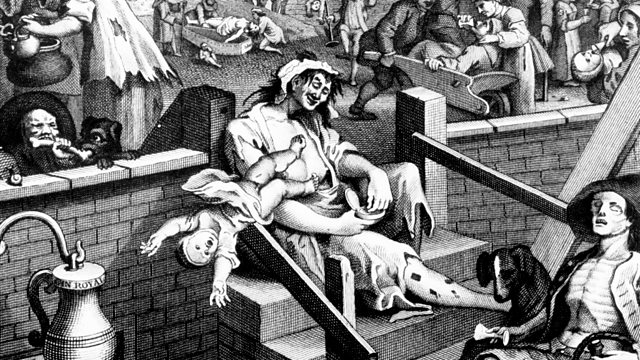
The Gin Act of 1736
Mark Whitaker explores the 18th-century Gin Craze, how Defoe and Fielding responded to it and what the authorities did to end it. From July 2010.
'Madam Geneva', she was called. The provider of 'Dutch Courage'. Mark Whitaker explores the Gin Craze of mid-18th-century England.
William Hogarth's 'Gin Lane' of 1751 is perhaps the best-known piece of propagandist art ever produced in England. It portrays the ravages of the gin addiction that for twenty-five years had dominated the life of the London poor. Gin had first been introduced into the country by William III and the landed classes soon became rich producing the grain from which it was distilled. Governments depended on taxing it.
But by the end of the 1720s people started to recognise the social damage it was causing. Nothing like it had been seen before. The best writers of the day took up the issue. Daniel Defoe wrote against 'the abuse of that nauseous liquor among our lower sort' and argued that it was undermining England's economic power. Henry Fielding called gin a 'diabolical liquor' and wanted it banned completely.
Walpole's government passed a series of gin acts, the most draconian being that of 1736. The liquor trade went underground and government informers roamed the streets. When serious riots broke out in Spitalfields in August 1736, Walpole explained them as the people's desperation at 'the approaching expiration of their darling vice'. But the government was forced to back down.
Actors read extracts from Defoe and Fielding, from Walpole's letters and from parliamentary debates.
Producer: Mark Whitaker
A Square Dog production for Βι¶ΉΤΌΕΔ Radio 4.
Last on
Broadcasts
- Tue 20 Jul 2010 15:45Βι¶ΉΤΌΕΔ Radio 4
- Thu 18 Apr 2013 14:15Βι¶ΉΤΌΕΔ Radio 4 Extra
- Tue 15 May 2018 14:15Βι¶ΉΤΌΕΔ Radio 4 Extra
- Wed 16 May 2018 02:15Βι¶ΉΤΌΕΔ Radio 4 Extra
